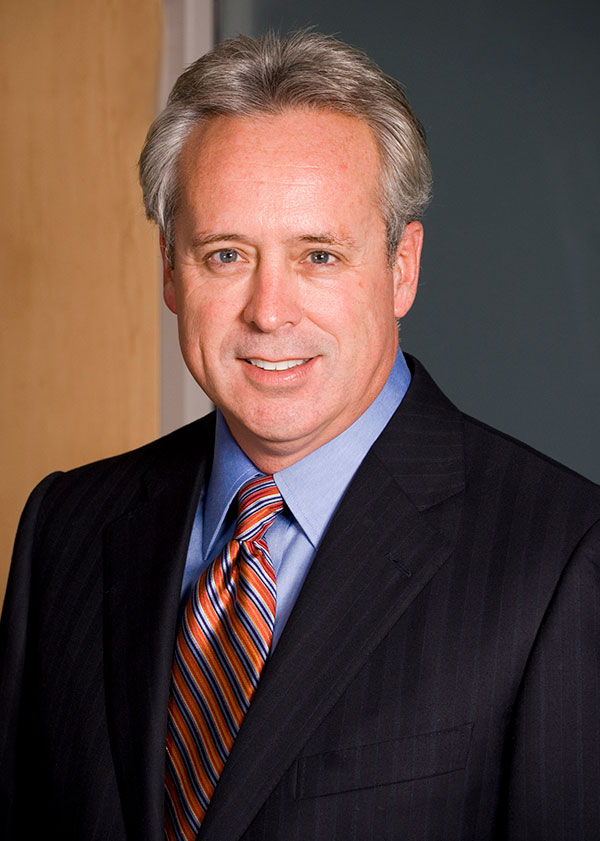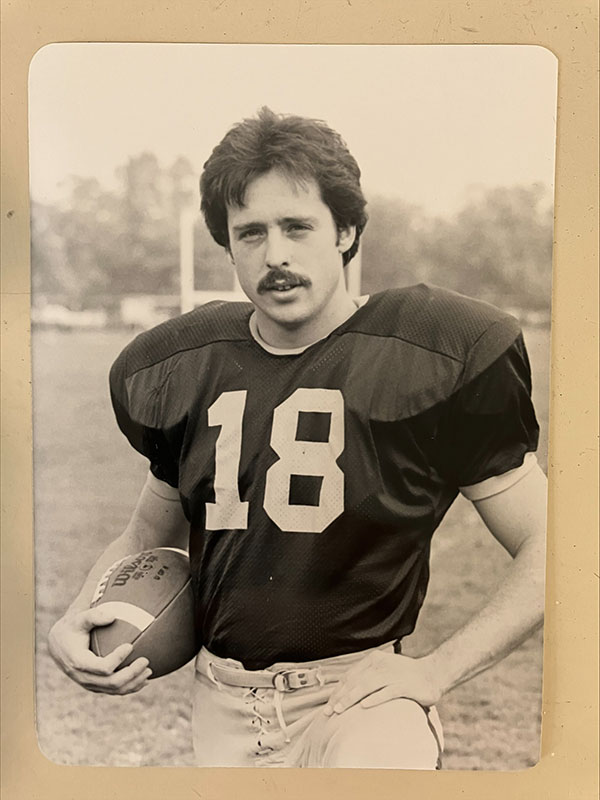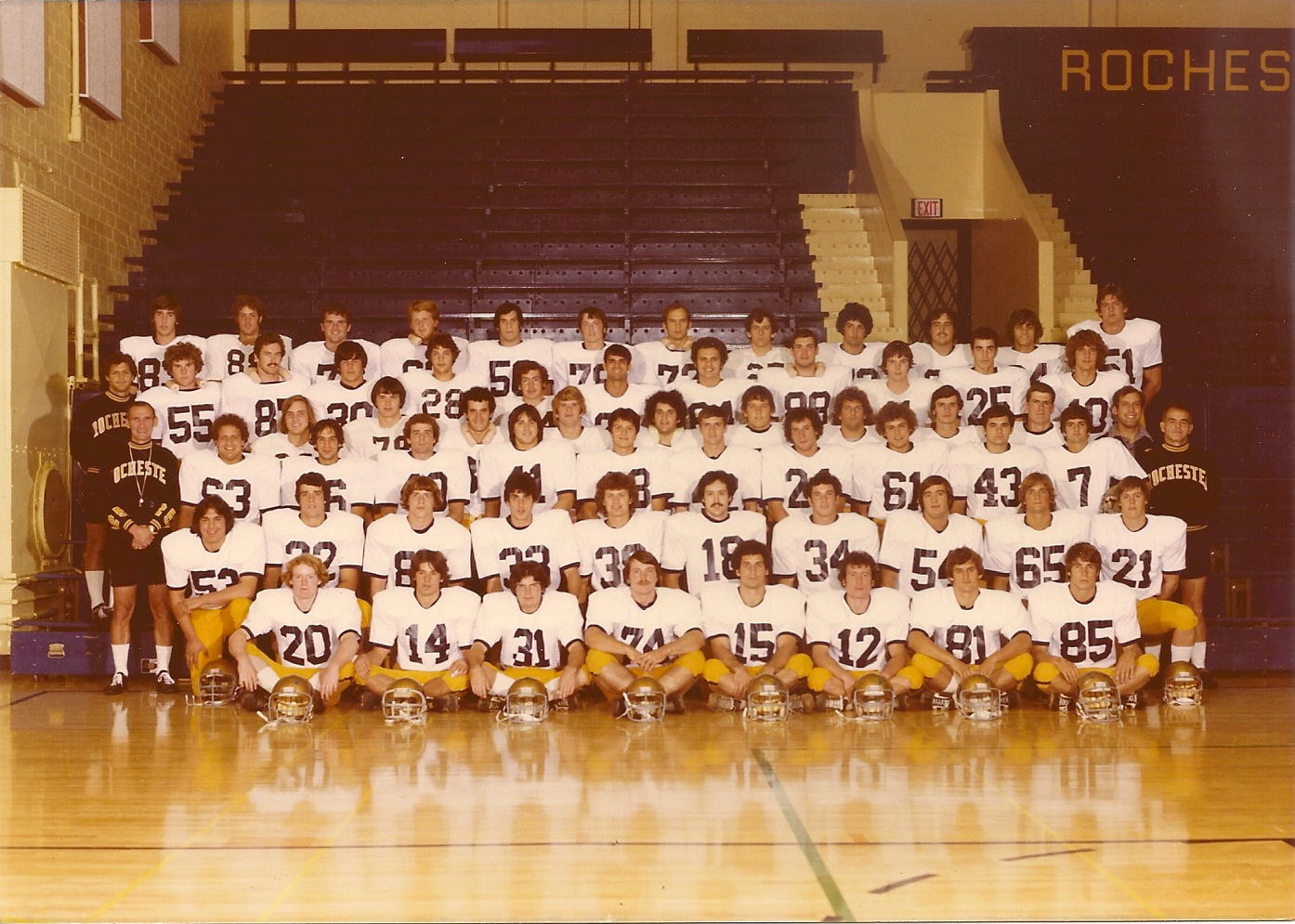Leadership lessons learned from football
Leadership lessons learned from football
Insights from Dr. Michael Recny ’79, business leader and former Rochester football player

Dr. Michael Recny ’79
For 40 years, Dr. Michael Recny ’79 served in various leadership roles in the biotechnology industry, including CEO of Calvert Holdings. Throughout his career, he and his teams have conducted pioneering biomedical research resulting in the development of innovative, life-saving FDA-approved drugs to treat HIV/AIDS, cancer, and anemia.
While Recny is now mostly retired, he continues to serve as the president of Calvert Research, an investment subsidiary of the company he helmed for many years. Reflecting on his career, Recny recognizes the profound impact of the lessons he learned on the football field at Rochester, lessons that helped shape him into a strong leader.
Recny didn’t come to Rochester to play football—he came as the recipient of a Joseph C. Wilson scholarship interested in the University’s rigorous academic program, particularly in the life sciences. “When it came to football, I was unknown,” he says. “During the first week of college, a current player said the football team needed more players. He knew I played one year in high school and suggested I try out.”
Recny took his advice, made the team, and then rode the bench for two years. Unbeknownst to him, his performance—his commitment during practice, the effort he exerted, and his interactions with the team—caught the attention of his late coach, the legendary Pat Stark.
In Recny’s junior year, Coach Stark gave him a shot to start. By the end of his senior season, Recny had earned the team award for Outstanding Back on Defense. At the same time, Recny had also designed his own interdisciplinary scientific major, enabling him to pursue unique coursework and independent laboratory research opportunities at both the River Campus and the Medical School.
Recny’s innovative approach to his education led him to create a distinctive, interdisciplinary undergraduate degree program. This paved the way for his admission to a top-ranked PhD biochemistry program at the University of Illinois, Urbana-Champaign. His academic journey continued to flourish as he earned a post-doctoral fellowship at Harvard Medical School and eventually became instrumental in launching and assuming leadership roles in multiple successful start-up biotech companies.
“In our lives and careers, each of us has an opportunity to play a vital role in every team we are part of. Football taught me invaluable lessons about the significance of always giving 100 percent—both on the field, and in professional settings.”
Recny’s top five

Michael Recny ’79 (#18)
1. Practice discipline Successful football players embody discipline and maintain a strong work ethic by putting in consistent effort and striving for excellence. Coach Stark emphasized that our performance during practice reflected how we’d play in a game. Consistency, effort, and discipline were key, as he would only field players who demonstrated an unwavering commitment to the team. This also holds true in the business world, too.
2. Build trust You can’t win a game on your own. You have to trust your teammates and they have to trust you as well. On a sports team and in the workplace, we all have to figure out how to add value to our team. Disrupting the team can impede progress and hinder achieving objectives. Ask yourself: Are you fully committed to making your team (and your company) successful? I recall a young wide receiver on my son’s high school football team a few years ago who had immense talent, capable of becoming a Division 1 football star. However, he relied on his talent and was lazy in practice, which was noticed by his teammates. It got to the point that the quarterback stopped throwing the ball to him in games. This hurt the team (and the player because he didn’t end up getting any scholarship offers). The same thing can happen in the workplace if you behave similarly.
3. Be accountable Being part of a team requires personal accountability, both to oneself and to others. You must take initiative, actively contribute, and focus on how you can strengthen your team. Suit up, show up, and strive to make a difference. You will occasionally make mistakes on the field and in your professional life but own them and don’t blame others. Avoid making excuses and instead reflect on how you learn from your experiences.
4. Demonstrate good character All sports teams start with the goal of being perfect, but how often does that happen? Striving for excellence and embracing failure as an opportunity to learn is crucial. Experiencing setbacks doesn’t define you as a failure. Your character determines how well you navigate this process. Coach Stark had zero tolerance for throwing helmets and complaining on the sidelines never ended well. It’s essential to display grace in both victory and defeat. This extends to our personal and professional lives as well.
5. Learn perseverance When I joined the Rochester football team, my skills were rusty compared to my teammates. Enduring two years on the bench really tested my perseverance. During that time, I saw multiple teammates quit who were unwilling to put in practice effort without seeing game time. Watching us was part of Coach Stark’s strategy. Before my junior year, he reassured me, “If you keep up what you are doing in practice, you will play for me one day.” I reminded myself of that every time I hit the practice field, and eventually, I gained the skills and confidence I needed to earn a starting role.
This mindset has guided me through my career’s toughest moments. For instance, while working for a biotech company that was developing a revolutionary experimental new drug to treat HIV/AIDS, at one point we were close to running out of money and faced potential bankruptcy. However, we believed in our novel approach and its life-changing potential, so the CEO asked me to take my R&D team and create a novel process to manufacture enough of the drug to test in HIV patients. We made it happen, and that drug turned out to be the most powerful HIV antiviral ever tested. I helped take my company public on those clinical results and the IPO funds paved the way to getting it FDA-approved to treat HIV/AIDS. More importantly, I was grateful to hear from HIV/AIDS patients that our drug saved their lives. This professional achievement stems from football’s lessons of perseverance, discipline, and teamwork, ones that gave me the confidence to endure and eventually succeed in our mission against long odds.
In recognition of his professional contributions to his field and to society and to honor his dedication to the University, Dr. Michael Recny will receive the University of Rochester’s Distinguished Alumnus Award and the Department of Athletics’ Garnish Citation Award this fall.

Michael Recny ’79 (#18)
Get in the game
Find out how you can support Rochester Athletics by contacting Terry Gurnett, Associate Director of Athletics.
—Kristine Kappel Thompson, August 2023


